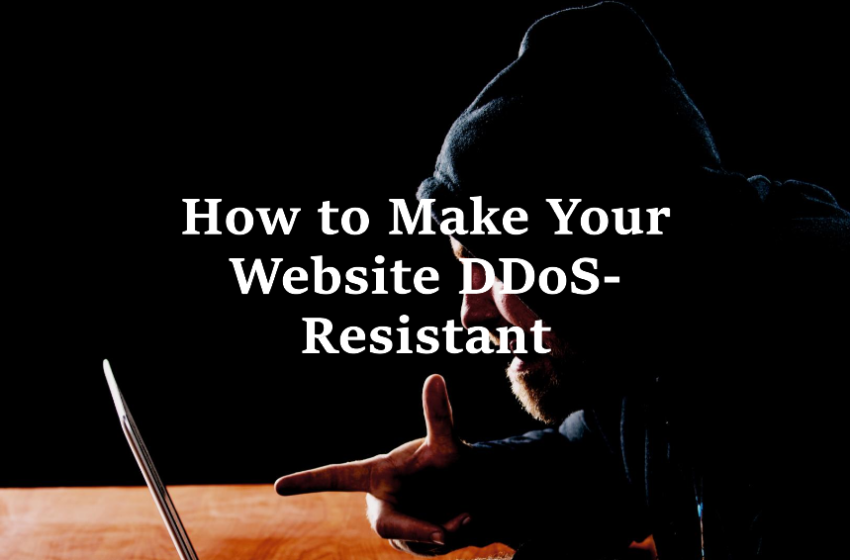How to Make Your Website DDoS-Resistant

Every business in today’s age has a website to get a digital presence of their company. While some websites are only made to expand the business reach, others solely rely on their site to grow their revenue. A website can provide a business countless advantages and opportunities to scale up with haste. However, websites are also exposed to various cybersecurity risks but the most common ones are DDoS (Distributed Denial-of-Service) attacks.
These types of attacks send abnormal traffic to the website server to affect its user experience. Websites under a DDoS attack often become inaccessible to their legitimate users, which can frustrate your audience. This can affect a business in many ways such as loss of business, angry customers, and increased bounce rates. Therefore, safeguarding your website against these attacks should be the top priority of every business owner.
Let’s dig deeper into the topic and explore how to make your website DDoS-Resistant.
5 Ways to Harden Your Website Security Against DDoS
DDoS attacks come in different ways and methods used by threat actors. Some attacks involve the process of directing the traffic to a specific website part or application. While other attacks such as protocol attack focuses on network infrastructure such as load balancers, firewalls, and application servers. In this article, you will uncover possible solutions you can adapt to prevent DDoS attacks on your website.
Here are 5 ways you can follow to prevent DDoS attacks.
1. Increase Bandwidth
One of the main targets of cybercriminals in a DDoS attack is to consume the bandwidth of the website server. When there are too many requests your website will be forced to respond and exceed its current bandwidth limit. As a result, the website will crash or become unresponsive to your legitimate visitors.
The best solution for such DDoS attacks is to increase the bandwidth limit of your server. However, if you are using hosting plans like shared hosting, then doing this is nearly impossible. This is because such hosting plans don’t offer any scalability options which prevents you from increasing bandwidth anytime you want. Considering this, site owners opt for a dedicated server hosting company in Dubai that provides scalable hosting plans.
2. Implement CDN
CDN (content delivery network) is not considered a solution to prevent DDoS attacks but it’s instead a way to mitigate them. CDN works as distributes your site assets across servers in different locations. This makes it difficult for cybercriminals to spot the main server of your website to launch attacks.
This will ensure if one part of your website is under a DDoS attack the rest of the site remains unaffected. This gives you enough time to implement solutions accordingly and mitigate the ongoing attacks.
3. Monitor Traffic and Identify Signs
To safeguard your website from DDoS attacks you must first learn to identify them. DDoS simply means that your server currently has traffic loads beyond its capabilities. However, this can happen even when you are not under attack. For example, when you are running a marketing campaign, there are good chances you will receive more than normal traffic.
Also, learn to monitor your daily traffic and acknowledge the average traffic you receive daily. This will allow you to quickly spot if there is a surge of unusual traffic being received by your site. When you learn the difference between normal and abnormal traffic, you can then apply possible solutions to safeguard your website.
Read also: The Ultimate Checklist for Buying a Dedicated Server
4. Implement WAF
WAF (Web Application Firewall) is another possible solution you can use against DDoS attacks. While this method isn’t a complete defense mechanism against all types of attacks it is very effective against some. WAF refers to the process of deploying a shield between the internet and the web application.
This works by identifying the traffic requests on your website and making them pass through WAF before reaching the server. This works by filtering and identifying the malicious traffic that can affect your site negatively. Thus, by using this, the risk of DDoS attacks and damage caused by them will be decreased significantly.
5. Get Server-Level DDoS Protection
As more companies started to encounter DDoS attacks, web hosting companies started to provide mitigation tools in their offering. However, this solution is not offered by every other host so you must look for the one that provides. A server-level DDoS protection can reduce the chances of these attacks drastically.
This also sets you free from worrying and implementing various DDoS protection solutions. As your host takes care of these matters, you can focus on other important aspects of your website. Considering this, you must opt for a secure dedicated server hosting services in Dubai that comes with proactive DDoS protection.
Read also: The Ultimate Guide to Hosting a Disney Plus Watch Party
Are You Worried About DDoS Attacks on Your Website?
Choosing the right hosting plan that comes with reliable DDoS protection is essential to keep your site secure from such threats. You can refer to professional service providers to get a DDoS-protected server. Contact professionals now and acquire a server that keeps your website safe from DDoS attacks.

